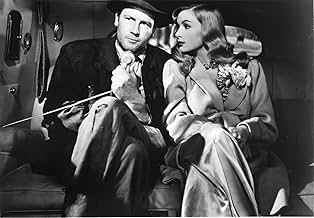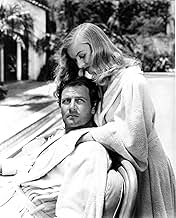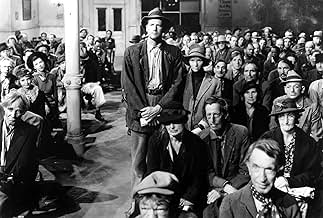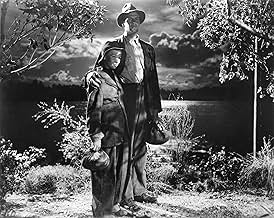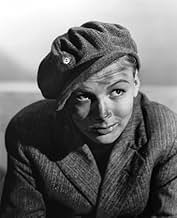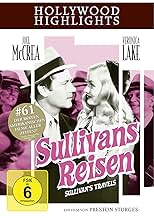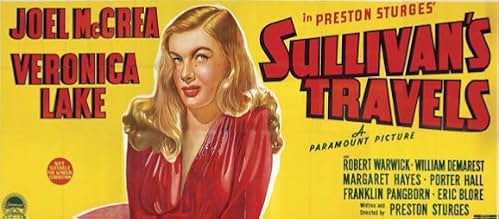Hollywood director John L. Sullivan sets out to experience life as a homeless person in order to gain relevant life experience for his next movie.Hollywood director John L. Sullivan sets out to experience life as a homeless person in order to gain relevant life experience for his next movie.Hollywood director John L. Sullivan sets out to experience life as a homeless person in order to gain relevant life experience for his next movie.
- Awards
- 2 wins total
Charles R. Moore
- Colored Chef
- (as Charles Moore)
- Director
- Writer
- All cast & crew
- Production, box office & more at IMDbPro
Featured reviews
10jhclues
When it comes right down to it, what you `think' you want isn't necessarily what you `really' want, nor is it likely to be anything you need. But finding the answer is up to the individual, a prospect that's explored in the satirical `Sullivan's Travels,' directed by Preston Sturges. Movie director John L. Sullivan (Joel McCrea) has made a career of churning out one successful comedy after another, yet he remains unfulfilled. He longs to do a `serious' film, one with meaning, a drama that will leave his mark on the industry and the world. And he has a property that he thinks is perfect, a screenplay entitled `O Brother, Where Art Thou?' The studio he works for, however, balks at the idea; Sullivan's comedies are not only good, they're a cash cow for the studio, so why fool with success?
Sullivan is adamant, though, and determined to make his film he strikes a bargain with the studio and gets the green light. But once he's given the go-ahead, he wants to do it right-- and he realizes that to make a truly meaningful film, he must first experience himself the hardships of life he will be examining in `O Brother.' So with only a dime in his pockets, he sets out on the road to find out what `life' is really all about. And before it's over, he will get all he's looking for and more, in an odyssey that will be unforgettable for Sullivan, and for the audience, as well.
Filled with pathos and poignancy, Sturges' film is an insightful sojourn across the territory of the human condition. It'll make you laugh and it'll make you cry, as along with Sullivan you come face to face with some hard truths about reality. And Sullivan's eventual epiphany regarding his personal wants and needs may be your own, as well, because this is a film with a definite message that is honest and undeniable. A lesson in life delivered subtly and sensitively by Sturges, who makes it entertaining and thought provoking at the same time. It's refreshing, in fact, t discover a film that delivers such an impact without having to resort to any kind of sensationalism, relying instead on the inherent humanity of the story, which Sturges conveys masterfully. With exceptions, of course, it's a sensibility few of today's directors seem to possess. Some notable exceptions would be Ang Lee with `The Ice Storm,' Kenneth Lonergan's `You Can Count On Me' and Tom DiCillo's `Box of Moonlight.' All are films that, like `Sullivan,' are journeys of discovery, profound in sentiment without being overly sentimental. There are more, to be sure, but they seem too few and far between.
One of the elements that makes this film so engaging is its colorful cast of characters, and the actors it employs to bring it to life, beginning with it's star, McCrea, who hits his stride as Sullivan with facility. He credibly reflects Sullivan's ideals and principles with a look, as well as an attitude, that makes it work quite naturally. You can believe this is a man with, perhaps not a naive, but certainly a rather guarded perception of life in the real world. Which is not to say he lacks insight or wisdom; it's merely one of the basic truths this film points out-- that people live within parameters of their own design, established through personal experience and frame of reference. And that's the John Sullivan McCrea presents here, with a portrayal that is honest and incisive.
Veronica Lake was one of the hottest actresses around in 1942 when this film was made, and as the girl who becomes a part of Sullivan's journey, she lends considerable charm and a bit of mystique to the film. It's a fairly straightforward role that benefits from her sparkle and personality; a notable performance that adds a touch of humor and some class to the proceedings, without being particularly exceptional. But watching her, it's easy to understand the attention she received, especially after draping her long blond hair across her eye, peek-a-boo style-- which started a craze that swept the country, while creating an indelible image that ultimately defined her career.
The supporting cast includes Robert Warwick (Mr. Lebrand), William Demarest (Mr. Jones), Franklin Pangborn (Mr. Casalsis), Porter Hall (Mr. Hadrian), Byron Foulger (Mr. Valdelle), Margaret Hayes (Secretary), Robert Greig (Sullivan's Butler) and Eric Blore (Sullivan's Valet). Call it a lesson in life, or a lesson about human nature; however you see it, `Sullivan's Travels' is an experience you're going to remember. Entertaining, enjoyable and enlightening, it's an uplifting appreciation of the way things are, and not necessarily the way you `think' they should be. It's a film that celebrates the comfort to be found in finding your own niche and realizing the importance of whatever it is that you contribute to your world and those around you. It leaves you with a sense of purpose and the understanding that the grass is not always greener on the other side. And it makes your own grass look pretty good in the bargain. It's the magic of the movies. I rate this one 10/10.
Sullivan is adamant, though, and determined to make his film he strikes a bargain with the studio and gets the green light. But once he's given the go-ahead, he wants to do it right-- and he realizes that to make a truly meaningful film, he must first experience himself the hardships of life he will be examining in `O Brother.' So with only a dime in his pockets, he sets out on the road to find out what `life' is really all about. And before it's over, he will get all he's looking for and more, in an odyssey that will be unforgettable for Sullivan, and for the audience, as well.
Filled with pathos and poignancy, Sturges' film is an insightful sojourn across the territory of the human condition. It'll make you laugh and it'll make you cry, as along with Sullivan you come face to face with some hard truths about reality. And Sullivan's eventual epiphany regarding his personal wants and needs may be your own, as well, because this is a film with a definite message that is honest and undeniable. A lesson in life delivered subtly and sensitively by Sturges, who makes it entertaining and thought provoking at the same time. It's refreshing, in fact, t discover a film that delivers such an impact without having to resort to any kind of sensationalism, relying instead on the inherent humanity of the story, which Sturges conveys masterfully. With exceptions, of course, it's a sensibility few of today's directors seem to possess. Some notable exceptions would be Ang Lee with `The Ice Storm,' Kenneth Lonergan's `You Can Count On Me' and Tom DiCillo's `Box of Moonlight.' All are films that, like `Sullivan,' are journeys of discovery, profound in sentiment without being overly sentimental. There are more, to be sure, but they seem too few and far between.
One of the elements that makes this film so engaging is its colorful cast of characters, and the actors it employs to bring it to life, beginning with it's star, McCrea, who hits his stride as Sullivan with facility. He credibly reflects Sullivan's ideals and principles with a look, as well as an attitude, that makes it work quite naturally. You can believe this is a man with, perhaps not a naive, but certainly a rather guarded perception of life in the real world. Which is not to say he lacks insight or wisdom; it's merely one of the basic truths this film points out-- that people live within parameters of their own design, established through personal experience and frame of reference. And that's the John Sullivan McCrea presents here, with a portrayal that is honest and incisive.
Veronica Lake was one of the hottest actresses around in 1942 when this film was made, and as the girl who becomes a part of Sullivan's journey, she lends considerable charm and a bit of mystique to the film. It's a fairly straightforward role that benefits from her sparkle and personality; a notable performance that adds a touch of humor and some class to the proceedings, without being particularly exceptional. But watching her, it's easy to understand the attention she received, especially after draping her long blond hair across her eye, peek-a-boo style-- which started a craze that swept the country, while creating an indelible image that ultimately defined her career.
The supporting cast includes Robert Warwick (Mr. Lebrand), William Demarest (Mr. Jones), Franklin Pangborn (Mr. Casalsis), Porter Hall (Mr. Hadrian), Byron Foulger (Mr. Valdelle), Margaret Hayes (Secretary), Robert Greig (Sullivan's Butler) and Eric Blore (Sullivan's Valet). Call it a lesson in life, or a lesson about human nature; however you see it, `Sullivan's Travels' is an experience you're going to remember. Entertaining, enjoyable and enlightening, it's an uplifting appreciation of the way things are, and not necessarily the way you `think' they should be. It's a film that celebrates the comfort to be found in finding your own niche and realizing the importance of whatever it is that you contribute to your world and those around you. It leaves you with a sense of purpose and the understanding that the grass is not always greener on the other side. And it makes your own grass look pretty good in the bargain. It's the magic of the movies. I rate this one 10/10.
As original a piece from the 1940s as you'll likely come across and one where it could quite easily have found itself as knotted and gnarled as some of the boots seen pounding the highways and byways of its cast. Fortunately those pretentious rips fail to appear and it's the arrival of Veronica Lake that turns the ramble to a journey and an illustration as relevant today about the lack of opportunity we continually chose to turn a blind eye to. An interesting twist towards the end provides something to chew on and supports a finale that may well give you a little to smile about, maybe even a chuckle.
Preston Sturges (1898-1959) wrote over 40 film screenplays spanning the years 1930-1958 and directed over a dozen films 1940-1955. His first attempt at directing was a success with a string of two popularly and critically acclaimed films in each of the years 1940 and 1941, "The Great McGinty", "Christmas in July"; "The Lady Eve" (starring Henry Fonda and Barbara Stanwyck), and this film, "Sullivan's Travels".
The beauty of "Sullivan's Travels" is the combination in genre of comedy as well as social satire and realism of the tough times of the Great Depression that the country had just weathered for a decade. Throw a romance in to the mix and a level of redirection of a "film on film" to make this an interesting film.
John Sullivan (Joel McCrea) is a famous director who is at odds with his production company. They want him to direct a comic film, while he wants to apply his talent to creating an analytic looking glass onto the sobering times called, "O Brother, Where Art Thou?". Wealthy and successful, he is mocked for not at all knowing misfortune - how would he make such a film? John takes this as a challenge, dresses as a hobo, and leaves the studio with a dime in his pocket to explore what life is like for the down and out.
However he tries to flee, he ends up getting somehow quickly being returned to Hollywood. Early on, he meets "the girl" (Veronica Lake; I don't recall her ever being given a name in the film) who sees that he is too innocent to survive on his own, and insists on bringing her broader knowledge of society to the journey and joining him to get him through this learning adventure.
The first part of the film is comic, but just as it seems to be coming to an unfulfilled ending, something unexpected happens. This event alters the course of everything and exposes John to some of the true injustices of the time - and shows him (and poignantly reminded me) that comedy is particularly important when some people have nothing else to cheer them up.
This is a film of classic Hollywood vintage, with good, snappy performances by both of the lead actors. The romance isn't at all developed but just seems to happen in a matter-of-fact way (perhaps we can take it on faith that there is instant chemistry), but what is lacking in psychology of the relationship is made up for in the chilling glimpse we get of the psyche of the underdog in Depression America.
--Dilip Barman June 19, 2004
The beauty of "Sullivan's Travels" is the combination in genre of comedy as well as social satire and realism of the tough times of the Great Depression that the country had just weathered for a decade. Throw a romance in to the mix and a level of redirection of a "film on film" to make this an interesting film.
John Sullivan (Joel McCrea) is a famous director who is at odds with his production company. They want him to direct a comic film, while he wants to apply his talent to creating an analytic looking glass onto the sobering times called, "O Brother, Where Art Thou?". Wealthy and successful, he is mocked for not at all knowing misfortune - how would he make such a film? John takes this as a challenge, dresses as a hobo, and leaves the studio with a dime in his pocket to explore what life is like for the down and out.
However he tries to flee, he ends up getting somehow quickly being returned to Hollywood. Early on, he meets "the girl" (Veronica Lake; I don't recall her ever being given a name in the film) who sees that he is too innocent to survive on his own, and insists on bringing her broader knowledge of society to the journey and joining him to get him through this learning adventure.
The first part of the film is comic, but just as it seems to be coming to an unfulfilled ending, something unexpected happens. This event alters the course of everything and exposes John to some of the true injustices of the time - and shows him (and poignantly reminded me) that comedy is particularly important when some people have nothing else to cheer them up.
This is a film of classic Hollywood vintage, with good, snappy performances by both of the lead actors. The romance isn't at all developed but just seems to happen in a matter-of-fact way (perhaps we can take it on faith that there is instant chemistry), but what is lacking in psychology of the relationship is made up for in the chilling glimpse we get of the psyche of the underdog in Depression America.
--Dilip Barman June 19, 2004
After the opening credits, the film opens with the following statement.
"To the memory of those who made us laugh: the motley mountebanks, the clowns, the buffoons, in all times and in all nations whose efforts have lightened our burden a little, this picture is affectionately dedicated."
With this film, Preston Sturges made one of the smartest and most insightful comedies ever to come out of Hollywood, in which he especially held up the mirror to Tinseltown itself. A Hollywood variation on Gulliver's Travels, it's the tale of Hollywood director John Sullivan (Joel McCrea), tired of making Hollywood Fluff, who wants to branch out with a socially conscious epic, called "O Brother, Where Art Thou", and sets out to research the meaning of poverty. His studio bosses (very funny roles by Robert Warwick and Porter Hall) try to tell him it's a ridiculous idea but Sullivan insists, puts on some hobo clothes and sets out to see what it's like to experience poverty and suffering. The studio soon sees it as potential publicity stunt and sent an entire crew to follow him around during his trip.
Some very enjoyable references to socially conscious movie-making, to Ernst Lubitch in particular, make this particularly fun with some knowledge of the period and the films mentioned, albeit not necessary. And almost worth seeing alone for Veronica Lake's memorable performance as a failed starlet.
According to Sturges, the film did contain a little "message":
"SULLIVAN'S TRAVELS is the result of an urge, an urge to tell some of my fellow filmwrights that they were getting a little too deep-dish and to leave the preaching to the preachers."
By any means, he made a uniquely self-reflective comedy about Hollywood with wonderful characterizations and superlative performances. A brilliant satire with a "message" just as poignant as ever.
Camera Obscura --- 9/10
"To the memory of those who made us laugh: the motley mountebanks, the clowns, the buffoons, in all times and in all nations whose efforts have lightened our burden a little, this picture is affectionately dedicated."
With this film, Preston Sturges made one of the smartest and most insightful comedies ever to come out of Hollywood, in which he especially held up the mirror to Tinseltown itself. A Hollywood variation on Gulliver's Travels, it's the tale of Hollywood director John Sullivan (Joel McCrea), tired of making Hollywood Fluff, who wants to branch out with a socially conscious epic, called "O Brother, Where Art Thou", and sets out to research the meaning of poverty. His studio bosses (very funny roles by Robert Warwick and Porter Hall) try to tell him it's a ridiculous idea but Sullivan insists, puts on some hobo clothes and sets out to see what it's like to experience poverty and suffering. The studio soon sees it as potential publicity stunt and sent an entire crew to follow him around during his trip.
Some very enjoyable references to socially conscious movie-making, to Ernst Lubitch in particular, make this particularly fun with some knowledge of the period and the films mentioned, albeit not necessary. And almost worth seeing alone for Veronica Lake's memorable performance as a failed starlet.
According to Sturges, the film did contain a little "message":
"SULLIVAN'S TRAVELS is the result of an urge, an urge to tell some of my fellow filmwrights that they were getting a little too deep-dish and to leave the preaching to the preachers."
By any means, he made a uniquely self-reflective comedy about Hollywood with wonderful characterizations and superlative performances. A brilliant satire with a "message" just as poignant as ever.
Camera Obscura --- 9/10
Sullivan's Travels is a twofer for me, it's my favorite Preston Sturges film and my favorite Joel McCrea one. It's an anti-message film, loaded with humor, with a most sublime message indeed.
Joel McCrea plays director John Sullivan who's tired of making silly comedies and musicals for his studio. He wants to make films of social significance with a message about the troubles in today's world.
Problem is that he doesn't know anything about poverty and unemployment, he's a rich kid who's been to boarding school. So off he sets, several times it turns out, to discover how the other half lives.
That last time he sets out is a bit unplanned and through a combination of circumstances he winds up on a prison chain gang in some southern state. He learns some really profound lessons from that experience.
But that's the serious side of Sullivan's Travels. Before that the film has some really gut splitting funny moments like McCrea learning about the speed of a whippet tank, being accused of stealing his own car. But my favorite is when he falls in the clutches of spinsters Elmira Sessions and Esther Howard. McCrea sets out to learn about poverty and deprivation and the two sisters see him as the answer to some poverty and deprivation they've been suffering for some time. Maybe the chain gang didn't look so bad.
Veronica Lake in her memoirs said that one of the films she enjoyed most was Sullivan's Travels where she plays an disillusioned Hollywood hopeful who befriends the tramp McCrea without knowing who he really is. The following year Lake would be paired with Alan Ladd who was closer to her height. She said McCrea was a kind and decent man and wonderful to work with. The disparity of their height was the source of some amusement and some problems for Preston Sturges. Lake was a tiny thing, it was why she was teamed with Alan Ladd, and McCrea was well over six feet tall. Check the shots of them together, very rarely will you see them standing side by side.
Sturges used a lot of his regular company of players. My two favorites in the supporting cast are Robert Grieg and Edward Blore who are McCrea's butler and valet. Both turn out to be wise men in their warnings to their boss about this folly he is undertaking.
It's been said that Sullivan's Travels is supposed to be the anti-Frank Capra film about messages. I'm not sure Capra saw it that way. If you look at the portion of the film when Sullivan falls into this unfamiliar universe of the chain gang, it's very similar to what George Bailey was experiencing in that parallel universe he was sent to in It's A Wonderful Life. I think Sturges and Capra would find a lot of common ground in the messages of It's A Wonderful Life and Sullivan's Travels.
Joel McCrea plays director John Sullivan who's tired of making silly comedies and musicals for his studio. He wants to make films of social significance with a message about the troubles in today's world.
Problem is that he doesn't know anything about poverty and unemployment, he's a rich kid who's been to boarding school. So off he sets, several times it turns out, to discover how the other half lives.
That last time he sets out is a bit unplanned and through a combination of circumstances he winds up on a prison chain gang in some southern state. He learns some really profound lessons from that experience.
But that's the serious side of Sullivan's Travels. Before that the film has some really gut splitting funny moments like McCrea learning about the speed of a whippet tank, being accused of stealing his own car. But my favorite is when he falls in the clutches of spinsters Elmira Sessions and Esther Howard. McCrea sets out to learn about poverty and deprivation and the two sisters see him as the answer to some poverty and deprivation they've been suffering for some time. Maybe the chain gang didn't look so bad.
Veronica Lake in her memoirs said that one of the films she enjoyed most was Sullivan's Travels where she plays an disillusioned Hollywood hopeful who befriends the tramp McCrea without knowing who he really is. The following year Lake would be paired with Alan Ladd who was closer to her height. She said McCrea was a kind and decent man and wonderful to work with. The disparity of their height was the source of some amusement and some problems for Preston Sturges. Lake was a tiny thing, it was why she was teamed with Alan Ladd, and McCrea was well over six feet tall. Check the shots of them together, very rarely will you see them standing side by side.
Sturges used a lot of his regular company of players. My two favorites in the supporting cast are Robert Grieg and Edward Blore who are McCrea's butler and valet. Both turn out to be wise men in their warnings to their boss about this folly he is undertaking.
It's been said that Sullivan's Travels is supposed to be the anti-Frank Capra film about messages. I'm not sure Capra saw it that way. If you look at the portion of the film when Sullivan falls into this unfamiliar universe of the chain gang, it's very similar to what George Bailey was experiencing in that parallel universe he was sent to in It's A Wonderful Life. I think Sturges and Capra would find a lot of common ground in the messages of It's A Wonderful Life and Sullivan's Travels.
Storyline
Did you know
- TriviaCinematographer John Seitz admired Preston Sturges' unconventional approach to his work. The opening scene comprised ten pages of dialogue to cover about four and a half minutes of screen time. It was scheduled for two complete days of shooting. On the morning of the first day, Seitz found Sturges inspecting the set with a viewfinder, looking for where he could cut the scene and change camera set-ups. Seitz dared him to do it all in one take. Never one to refuse a dare, Sturges took him up on it, although the nervous Seitz had never attempted to complete a two-day work schedule in one day. With the endorsement of McCrea and the rest of the actors, Sturges pressed on, determined to set a record. The first take was fine, but the camera wobbled a little in the tracking shot following the men from screening room to office, so they tried again. They did two or three takes at the most and that was it - two full days work by 11 a.m. on the first day, a feat that had the entire studio buzzing.
- GoofsWhen Sullivan and the Girl jump off the train and walk to the lunch stand, nothing is visible around the outside of the lunch stand--not a car, tree or anything. When Sullivan asks if the proprietor had seen a land yacht (a big RV), the proprietor points to the side and they look out the window and see the big land yacht parked there. Of course, if it had been there in the first place, Sullivan would have seen it right away and not gone into the lunch stand.
- Quotes
[last lines]
John L. Sullivan: There's a lot to be said for making people laugh. Did you know that that's all some people have? It isn't much, but it's better than nothing in this cockeyed caravan.
- Crazy creditsThe Paramount logo appears as a seal on a package.
The package is opened to reveal a book with the film title on it and the opening credits appear on pages in the book.
- ConnectionsFeatured in The Cinematographer (1951)
- SoundtracksSpring Song
(1844) (uncredited)
Written by Felix Mendelssohn
Played as part of the score when Sullivan starts his experiment
Reprised when he starts a second time
Details
Box office
- Budget
- $689,665 (estimated)
- Gross worldwide
- $10,272
- Runtime1 hour 30 minutes
- Color
- Aspect ratio
- 1.37 : 1
Contribute to this page
Suggest an edit or add missing content



